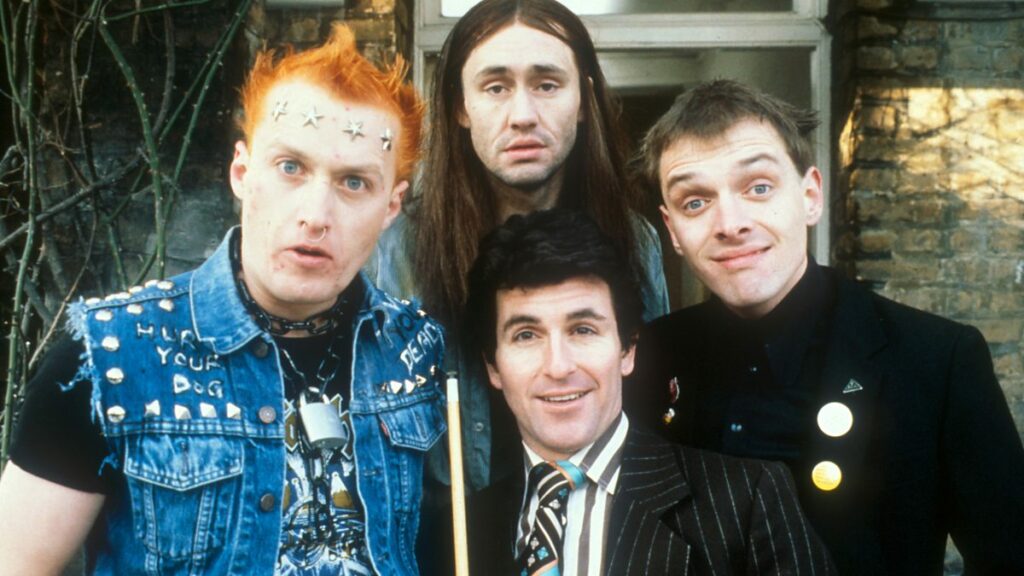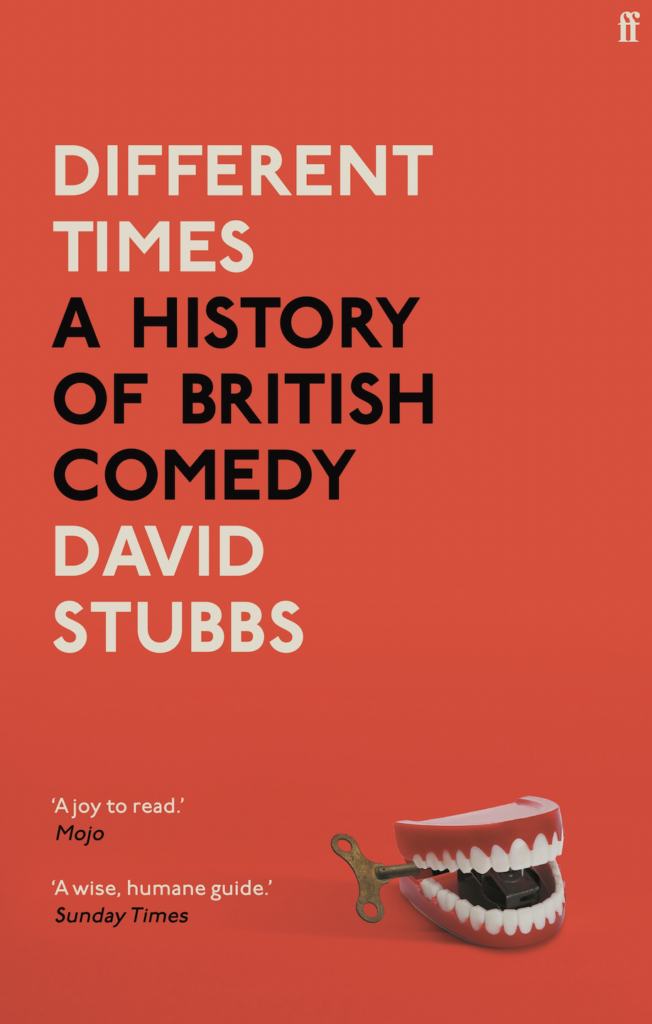From Python to the Young Ones, how British comedy and music became forever linked
As he releases a new book looking back at the history of British comedy, writer David Stubbs explains how it's always found an unlikely friend in music
By David Stubbs

There exists a photograph of Joyce Grenfell, the brilliant comedienne, who features in such 1950s British comedy film classics as The Belles Of St Trinians, The Happiest Days Of Your Life and Genevieve, looking on fondly among a group of admirers at a young Elvis Presley. She was hardly to know that he representing an incoming cultural force, that of rock’n’roll, which would obliterate the sensibility of the British comedy she co-represented, was founded. Her film career was pretty much at an end.
Comedy and pop and rock music are in many ways as incompatible as ice cream and gravy, two wholly distinct pleasures. There is a certain, unsmiling intensity about rock and pop at their best, which the introduction of mirth only punctures.
Granted, and inevitably given their cultural proximity, there have been some intriguing comedy/musical overlaps. George Martin, producer of The Beatles, originally made his name in the business producing comedy records. Charlie Drake, one of the most popular UK comedians of the 1960s, cut a single produced by Genesis’s Peter Gabriel, with Phil Collins on drums and Sandy Denny on backing vocals, the oddest of combinations. Meanwhile, the legendary avant garde Improv guitarist Derek Bailey made a living playing in the house band for Morecambe & Wise. More inadvertently, perhaps, when Sparks appeared on Top Of The Pops in 1974, with an unsmiling, glowering, moustached Ron Mael at the keyboard, he prefigured Basil Fawlty, who would make his TV debut a year later.
The relationship, however, has always been an uneasy one. Ken Dodd was both a successful comedian and, in the 1960s a chart topping singer with hits like ‘Tears’ but these were two wholly separate career paths. When he met The Beatles in the early 60s, you sensed his genial bemusement, referring to them as “Martians” – a whole other species. It was a bemusement that would persist for years among mainstream British comedians, when confronted by the likes of Mick Jagger.
Even Monty Python, whose rise in the late 1960s and early 1970s earned them the sort of cult following enjoyed by the sort of groups who appeared on The Old Grey Whistle Test, and whose fans and funders included prominent rock stars of the day, including George Harrison, wisely gave rock and pop a wide berth, early on in particular depicting a Britain in which it simply did not exist.

In the 1990s, comedy was declared to be “the new rock’n’roll”, as comedians like David Baddiel and Rob Newman in particular found themselves playing in front of the sort of mass, euphoric audiences who were congregating in adoration of the biggest stars of Britpop. But it was a mismatch. Despite their use in their soundtracks of relatively esoteric groups like Ride, their mostly so-so comedy was simply drowned out by the mass idolatry visited on them – they split up, scaled down. Meanwhile, around this time, surrealist comedian Vic Reeves teamed up with The Wonder Stuff to cut “Dizzy”. It was a hit but it wasn’t a success – it wasn’t funny, merely a pop record compromised by Reeves’s presence.
In terms of sensibility, however, there are significant parallels and cross-fertilisations.
The most significant of these was the rise of alternative comedy in the late 1970s, which sprang from the same cultural impulse as punk rock. Alternative comedy was meta, ironic, iconoclastic, come to drive out the old dinosaurs, the old dinosaur attitudes and succeeded ultimately in reconfiguring the comedy landscape, much as punk reconfigured the rock (and pop) landscape. Its earliest great flowering was The Young Ones, whose principal characters – painful NME reader, punk/metalhead, hippy – were subcultural rock creatures. Their regular guest bands, from Motorhead to Madness, stressed this connection.
Still later, in the evolutionary work of Chris Morris, the unlikely relationship between comedy and music deepened. There was about Morris a deadly, unnerving seriousness, even when he was at his most hilarious. This was exacerbated in his TV series Jam, whose ultra-mordant sketches were soundtracked by the likes of The Aphex Twin and Bark Psychosis, purveyors of the darkest Ambient.
Another curious success story of comedy and music is Graham Fellows, aka John Shuttleworth, who had a post-punk hit with the embittered “Jilted John”. As Shuttleworth, he plays a character from the Northern suburbs hoping somehow to make a pop career from his portable Casio musings and deliberately mundane ditties about pigeons and garden centres. However, as his Lincolnshire neighbour, the great Robert Wyatt once asserted, there is a genuine, touching beauty about his cheaply wrought songs and melodies.
Finally, there is Stewart Lee, whose brilliantly structured meta-comedy is informed by the processes of the avant garde and left field music of which he is such a huge fan, from Steve Beresford to The Fall and the aforementioned Derek Bailey. He is the supreme example of how music, the least ostensibly “comedic” of music can, albeit via oblique strategies, result in hard, hard laughter.
David Stubbs is the author of Different Times: A History of British Comedy, out now on Faber.
